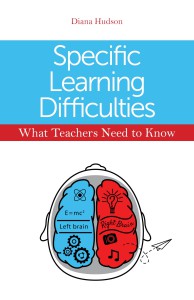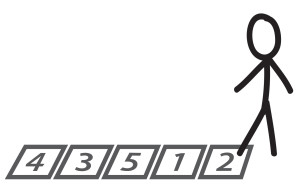 Diana Hudson, author of Specific Learning Difficulties – What Teachers Need to Know, is a tutor and mentor to students with Specific Learning Difficulties (SpLD), as well as a subject classroom teacher (biology) and she has been a SENCO. She also has a diagnosis of dyslexia herself, and is a parent to four children, three of whom have been diagnosed with SpLD. In this post she gives her top tips and advice for parents who think their child may have a specific learning difficulty, and looks at how children with SpLD’s can best be supported.
Diana Hudson, author of Specific Learning Difficulties – What Teachers Need to Know, is a tutor and mentor to students with Specific Learning Difficulties (SpLD), as well as a subject classroom teacher (biology) and she has been a SENCO. She also has a diagnosis of dyslexia herself, and is a parent to four children, three of whom have been diagnosed with SpLD. In this post she gives her top tips and advice for parents who think their child may have a specific learning difficulty, and looks at how children with SpLD’s can best be supported.
What are Specific Learning Difficulties?
People who have Specific Learning Difficulties (SpLD’s) are of normal to high intelligence but they have a difficulty in one particular area of learning while performing satisfactorily in other areas. All these conditions vary in severity from mild to severe so no two students will be the same.
Just to confuse matters further, there is also considerable co-existence of the conditions for example, some people with dyslexia may also have dyscalculia or dyspraxia, others will not. Each child is different.
How would I spot an SpLD?
If your child seems intelligent and articulate but struggles disproportionately in one area of learning they may have a SpLD.
Can they be cured?
No. They are lifelong conditions but children can be taught to learn in different ways and achieve success.
Are there any advantages?
Yes. People with SpLD have many skills. They are often lateral thinkers, innovative and tenacious. They can be prepared to work harder to excel.
Specific Learning Difficulties in Main Stream Schools
| Specific Learning Difficulty | Problems with | Incidence up to % of population | Special attributes – in all categories the child can be very intelligent |
| Dyslexia | Reading, writing and spelling
Organisation, directions |
10% | Imaginative, creative, empathetic, artistic, good verbally. |
| Dyscalculia | Numbers and arithmetic | 5% | Good with language, poetic, artistic, tenacious, imaginative. |
| Dysgraphia | Physical problems with handwriting and expressing thoughts in writing | 10% | Creative, imaginative, sociable, good at music, drama, sport, and computer based skills. |
| Dyspraxia | Movement and coordination, organisation | 5% | Creative, imaginative, good at literature, poetry drama, debating, ICT, maths |
| Attention Deficit Hyperactivity Disorder (ADHD): | Short attention span, lively impulsive behaviour, organisation | 5% | Enthusiastic, energetic, innovative, adventurous, charismatic. |
| Autistic Spectrum Disorders (ASD) such as Asperger’s Syndrome | Social interaction and communication; preoccupation with very narrow interests | 1-2% high functioning in main stream school | Straightforward
Single minded Very knowledgeable on certain topics, observant, logical. |
How can I find out for certain?
Testing for SpLD can be carried out by an Educational Psychologist or a trained specialist teacher. ADHD and ASD require a medical diagnosis.
Is it just about spelling, reading, writing and maths?
No the effects of SpLD’s are broader and often involve other areas of life: organisational skills, sense of direction, understanding questions, short term / working memory, time keeping, social difficulties with peers. The details will depend on the type of SpLD.
What can I reasonably expect school to do to support my child? 
Schools should have a copy of the specialist report and follow any recommendations. The school SENCO (Special Educational Needs Coordinator) should be your point of contact but all your child’s teachers should be aware of their difficulties. Extra 1:1 support lessons are usually very helpful.
How can I help as a parent?
Be upbeat, supportive and positive. Help your child to find strengths and always acknowledge success. Realise that learning can be very hard work and tiring.
Low self- esteem is common in children with SpLD, especially when they have to deal with school. They can become frustrated, angry and disappointed when their intelligence is not accurately reflected by a series of marks for tests or essays.
Let them know that you understand their difficulties and that making mistakes is part of learning and not a disaster. Retain your sense of humour and perspective. Enjoy your child’s quirky behaviours, help them to value their own strengths and gain in confidence.
What about exams?
Some students diagnosed with SpLD may be eligible for a variety of special arrangements in exams. Examples are extra time, using a computer, rest breaks, enlarged question papers, coloured papers, taking the exam in a separate room. It will be specific to their needs.
Revision is a nightmare. Are there different approaches?
Most students with SpLD have short term memory difficulties so they are unable to cram the night before. Encourage them to start revising early, work in short sessions and use multisensory methods for reinforcement. Colour, mnemonics, songs, and computer graphics – anything to get information stored in long term memory. Rest and exercise are also important.
Should SpLD be declared on a UCCAS form?
Yes. Universities cannot discriminate, and most have learning support departments and are very good at supporting students with SpLD. Often universities like intelligent lateral thinkers.
Career prospects
People with SpLD can have successful careers in most walks of life. Go with your child’s strengths, talents and interests and encourage them to follow their dreams.
If you want to know more about identifying and supporting children with SpLD’s, check out Diana’s book here.
You can also watch a video of Diana speaking about the topic here.